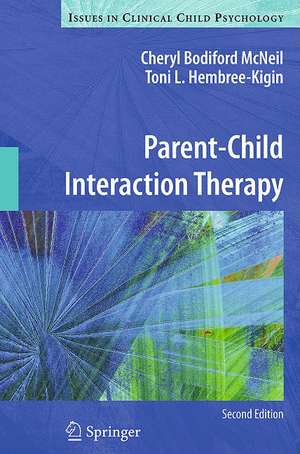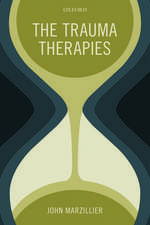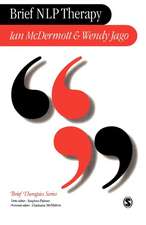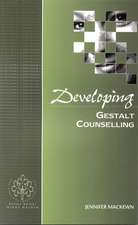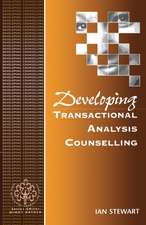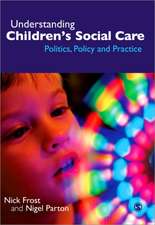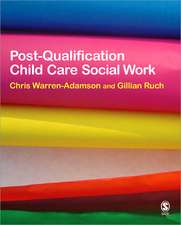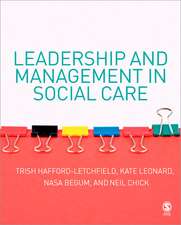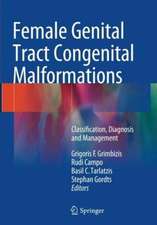Parent-Child Interaction Therapy: Issues in Clinical Child Psychology
Autor Cheryl Bodiford McNeil, Toni L. Hembree-Kiginen Limba Engleză Paperback – 16 feb 2011
This update retains the fundamentals as detailed by PCIT's founder, Dr. Sheila Eyberg, including an overview of the therapy, detailed description of the course of treatment, and handout materials. The text goes further to explore the evolution of PCIT outside the original target ages of three-to-six (including preventive PCIT for very young children at risk) and examines the use of PCIT with special child populations, such as abuse victims and those with ADHD. Contributing experts discuss uses of the therapy in school, at home, with minorities, and with highly stressed families. But regardless of the population, setting, or topic covered, interventions remain faithful to basic PCIT principles and methods.
New features of the expanded second edition include:
- Adaptations of PCIT for babies, toddlers, preteens, and siblings.
- Applications for abuse survivors, children with developmental disabilities, ADHD, and severe aggression problems.
- Uses of PCIT with separating or divorced parents.
- Culturally relevant PCIT for ethnic minority and international families.
- Teacher-child, staff-child, and home-based applications.
- PCIT training guidelines.
- A brand-new chapter summarizing current research supporting PCIT.
| Toate formatele și edițiile | Preț | Express |
|---|---|---|
| Paperback (1) | 1008.91 lei 6-8 săpt. | |
| Springer Us – 16 feb 2011 | 1008.91 lei 6-8 săpt. | |
| Hardback (1) | 1396.08 lei 6-8 săpt. | |
| Springer Us – 16 feb 2010 | 1396.08 lei 6-8 săpt. |
Din seria Issues in Clinical Child Psychology
- 5%
 Preț: 1346.28 lei
Preț: 1346.28 lei - 5%
 Preț: 372.03 lei
Preț: 372.03 lei - 18%
 Preț: 727.97 lei
Preț: 727.97 lei - 18%
 Preț: 2116.32 lei
Preț: 2116.32 lei - 5%
 Preț: 2144.78 lei
Preț: 2144.78 lei - 5%
 Preț: 1318.81 lei
Preț: 1318.81 lei - 18%
 Preț: 1662.70 lei
Preț: 1662.70 lei - 5%
 Preț: 1444.63 lei
Preț: 1444.63 lei - 18%
 Preț: 1831.42 lei
Preț: 1831.42 lei - 5%
 Preț: 1131.72 lei
Preț: 1131.72 lei - 15%
 Preț: 645.79 lei
Preț: 645.79 lei - 5%
 Preț: 1437.86 lei
Preț: 1437.86 lei - 18%
 Preț: 1835.21 lei
Preț: 1835.21 lei - 18%
 Preț: 2110.97 lei
Preț: 2110.97 lei - 5%
 Preț: 1941.84 lei
Preț: 1941.84 lei - 18%
 Preț: 1824.95 lei
Preț: 1824.95 lei - 5%
 Preț: 1343.45 lei
Preț: 1343.45 lei - 5%
 Preț: 721.19 lei
Preț: 721.19 lei - 5%
 Preț: 1429.44 lei
Preț: 1429.44 lei - 5%
 Preț: 719.59 lei
Preț: 719.59 lei - 15%
 Preț: 647.27 lei
Preț: 647.27 lei - 18%
 Preț: 1234.14 lei
Preț: 1234.14 lei - 18%
 Preț: 1842.16 lei
Preț: 1842.16 lei - 18%
 Preț: 949.42 lei
Preț: 949.42 lei - 5%
 Preț: 1130.43 lei
Preț: 1130.43 lei - 15%
 Preț: 591.29 lei
Preț: 591.29 lei - 18%
 Preț: 1126.52 lei
Preț: 1126.52 lei - 18%
 Preț: 950.52 lei
Preț: 950.52 lei - 18%
 Preț: 1245.84 lei
Preț: 1245.84 lei
Preț: 1008.91 lei
Preț vechi: 1230.38 lei
-18% Nou
Puncte Express: 1513
Preț estimativ în valută:
193.08€ • 199.19$ • 163.41£
193.08€ • 199.19$ • 163.41£
Carte tipărită la comandă
Livrare economică 05-19 martie
Preluare comenzi: 021 569.72.76
Specificații
ISBN-13: 9781441995759
ISBN-10: 1441995757
Pagini: 504
Ilustrații: XVIII, 484 p.
Dimensiuni: 155 x 235 x 33 mm
Greutate: 0.7 kg
Ediția:2nd ed. 2010
Editura: Springer Us
Colecția Springer
Seria Issues in Clinical Child Psychology
Locul publicării:New York, NY, United States
ISBN-10: 1441995757
Pagini: 504
Ilustrații: XVIII, 484 p.
Dimensiuni: 155 x 235 x 33 mm
Greutate: 0.7 kg
Ediția:2nd ed. 2010
Editura: Springer Us
Colecția Springer
Seria Issues in Clinical Child Psychology
Locul publicării:New York, NY, United States
Public țintă
Professional/practitionerCuprins
Fundamentals of Parent-Child Interaction Therapy.- Overview of Parent-Child Interaction Therapy.- Research on PCIT.- Intake Assessment and Therapy Orientation Session.- Teaching Child-Directed Interaction.- Coaching Child-Directed Interaction.- Teaching Parent-Directed Interaction.- Coaching Parent-Directed Interaction.- Progressing Through the Parent-Directed Interaction Sessions.- Adaptations of Parent-Child Interaction Therapy.- Younger Children.- Older Children.- Siblings.- Autism Spectrum Disorders.- Child Physical Abuse.- Anxiety Disorders.- Attention Deficit Hyperactivity Disorder.- Extremely Aggressive and Explosive Children.- Marital Conflict.- Parents with Major Life Stressors.- Ethnic Minority Children and Families.- Staff-Child Interaction Therapy.- Teacher–Child Interaction Therapy for Preschool Classrooms.- School Consultation.- Home-Based PCIT: From the Lab to the Living Room.- PCIT Around the World.- Training Issues.- Appendices.
Notă biografică
Cheryl Bodiford McNeil, Ph.D., is a Professor of Psychology in the Clinical Child Program at West Virginia University. She received her Ph.D. from the University of Florida. Dr. McNeil's clinical and research interests are focused on program development and evaluation, specifically with regard to abusive parenting practices and managing the disruptive behaviors of young children in both the home and school settings. She has authored two books (Parent-Child Interaction Therapy and Short-Term Play Therapy for Disruptive Children), a continuing education package (Working with Oppositional Defiant Disorder in Children), a psychotherapy DVD for the American Psychological Association (Parent-Child Interaction Therapy), and a classroom management program (The Tough Class Discipline Kit). In addition, Dr. McNeil has published numerous research articles and chapters related to the importance of intervening early with young children displaying disruptive behaviors. She is the wife of Dr. Daniel McNeil, a Professor of Psychology, and the mother of two school-aged boys.
Toni Hembree-Kigin, Ph.D., is a licensed psychologist in independent practice in Mesa, Arizona. She received her Ph.D. from the University of Florida. Dr. Hembree-Kigin's clinical and research interests are focused on young children with disruptive behavior problems and those in shelter and foster care. She has authored three books (Mental Health Interventions with Preschool children, Parent-Child Interaction Therapy, and Short-Term Play Therapy for Disruptive Children) and a continuing education package (Working with Oppositional Defiant Disorder in Children). Dr. Hembree-Kigin designed the therapeutic milieu in the group home and shelter care for the Child Crisis Center East Valley based on the PCIT model. In addition, Dr. Hembree-Kigin has published numerous research articles and chapters related to the importance of intervening early with youngchildren displaying disruptive behaviors. She is the wife of Dr. Timothy Kigin, school psychologist, and mother of three school-aged children.
Toni Hembree-Kigin, Ph.D., is a licensed psychologist in independent practice in Mesa, Arizona. She received her Ph.D. from the University of Florida. Dr. Hembree-Kigin's clinical and research interests are focused on young children with disruptive behavior problems and those in shelter and foster care. She has authored three books (Mental Health Interventions with Preschool children, Parent-Child Interaction Therapy, and Short-Term Play Therapy for Disruptive Children) and a continuing education package (Working with Oppositional Defiant Disorder in Children). Dr. Hembree-Kigin designed the therapeutic milieu in the group home and shelter care for the Child Crisis Center East Valley based on the PCIT model. In addition, Dr. Hembree-Kigin has published numerous research articles and chapters related to the importance of intervening early with youngchildren displaying disruptive behaviors. She is the wife of Dr. Timothy Kigin, school psychologist, and mother of three school-aged children.
Textul de pe ultima copertă
Over the past two decades, Parent-Child Interaction Therapy (PCIT) emerged as a leading-edge method for helping parents improve their children's disruptive and oppositional behavior. Today, PCIT has a robust evidence base; is used across the country in settings as diverse as hospitals, mental health centers, schools, and mobile clinics; and is rapidly gaining popularity in other parts of the world. In keeping with this increasing recognition of PCIT's effectiveness, the authors of Parent-Child Interaction Therapy present this expanded clinical edition to keep readers up to date on new practice developments, current treatment protocols, and the latest research findings.
This update retains the fundamentals as detailed by PCIT's founder, Dr. Sheila Eyberg, including an overview of the therapy, detailed description of the course of treatment, and handout materials. The text goes further to explore the evolution of PCIT outside the original target ages of three-to-six (including preventive PCIT for very young children at risk) and examines the use of PCIT with special child populations, such as abuse victims and those with ADHD. Contributing experts discuss uses of the therapy in school, at home, with minorities, and with highly stressed families. But regardless of the population, setting, or topic covered, interventions remain faithful to basic PCIT principles and methods.
New features of the expanded second edition include:
This update retains the fundamentals as detailed by PCIT's founder, Dr. Sheila Eyberg, including an overview of the therapy, detailed description of the course of treatment, and handout materials. The text goes further to explore the evolution of PCIT outside the original target ages of three-to-six (including preventive PCIT for very young children at risk) and examines the use of PCIT with special child populations, such as abuse victims and those with ADHD. Contributing experts discuss uses of the therapy in school, at home, with minorities, and with highly stressed families. But regardless of the population, setting, or topic covered, interventions remain faithful to basic PCIT principles and methods.
New features of the expanded second edition include:
- Adaptations of PCIT for babies, toddlers, preteens, and siblings.
- Applications for abuse survivors, children with developmental disabilities, ADHD, and severe aggression problems.
- Uses of PCIT with separating or divorced parents.
- Culturally relevant PCIT for ethnic minority and international families.
- Teacher-child, staff-child, and home-based applications.
- PCIT training guidelines.
- A brand-new chapter summarizing current research supporting PCIT.
Caracteristici
Summarizes the research regarding clinical innovations in the PCIT program as well as applications to specialized populations Retains much of the original information regarding the fundamentals of PCIT from the 1st edition, but also presents applications of PCIT to special populations Discusses how to apply these treatment techniques to toddlers, older children, and siblings Includes supplementary material: sn.pub/extras
